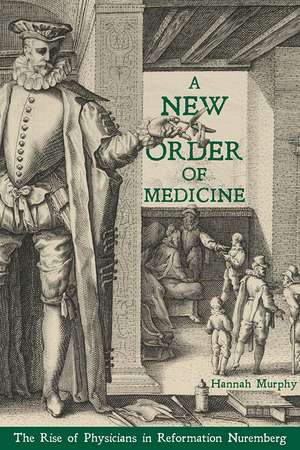A New Order of Medicine: The Rise of Physicians in Reformation Nuremberg
Autor Hannah Murphyen Limba Engleză Hardback – 18 iun 2019
Winner, 2020 SRS Book Prize
The sixteenth century saw an unprecedented growth in the number of educated physicians practicing in German cities. Concentrating on Nuremberg, A New Order of Medicine follows the intertwined careers of municipal physicians as they encountered the challenges of the Reformation city for the first time. Although conservative in their professed Galenism, these men were eclectic in their practices, which ranged from book collecting to botany to subversive anatomical experimentations. Their interests and ambitions lead to local controversy. Over a twenty-year campaign, apothecaries were wrested from their place at the forefront of medical practice, no longer able to innovate remedies, while physicians, recent arrivals in the city, established themselves as the leading authorities. Examining archives, manuscript records, printed texts, and material and visual sources, and considering a wide range of diseases, Hannah Murphy offers the first systematic interpretation of the growth of elite medical “practice,” its relationship to Galenic theory, and the emergence of medical order in the contested world of the German city.
The sixteenth century saw an unprecedented growth in the number of educated physicians practicing in German cities. Concentrating on Nuremberg, A New Order of Medicine follows the intertwined careers of municipal physicians as they encountered the challenges of the Reformation city for the first time. Although conservative in their professed Galenism, these men were eclectic in their practices, which ranged from book collecting to botany to subversive anatomical experimentations. Their interests and ambitions lead to local controversy. Over a twenty-year campaign, apothecaries were wrested from their place at the forefront of medical practice, no longer able to innovate remedies, while physicians, recent arrivals in the city, established themselves as the leading authorities. Examining archives, manuscript records, printed texts, and material and visual sources, and considering a wide range of diseases, Hannah Murphy offers the first systematic interpretation of the growth of elite medical “practice,” its relationship to Galenic theory, and the emergence of medical order in the contested world of the German city.
Preț: 424.88 lei
Nou
Puncte Express: 637
Preț estimativ în valută:
81.30€ • 86.94$ • 67.79£
81.30€ • 86.94$ • 67.79£
Carte disponibilă
Livrare economică 28 martie-11 aprilie
Preluare comenzi: 021 569.72.76
Specificații
ISBN-13: 9780822945604
ISBN-10: 0822945606
Pagini: 280
Ilustrații: 24 b&w
Dimensiuni: 152 x 229 x 28 mm
Greutate: 0.5 kg
Ediția:1
Editura: University of Pittsburgh Press
Colecția University of Pittsburgh Press
ISBN-10: 0822945606
Pagini: 280
Ilustrații: 24 b&w
Dimensiuni: 152 x 229 x 28 mm
Greutate: 0.5 kg
Ediția:1
Editura: University of Pittsburgh Press
Colecția University of Pittsburgh Press
Recenzii
“Hannah Murphy takes us on a fascinating adventure through the professional world of Renaissance physicians, illuminating the civic commitments that shaped their identity, the new and traditional areas of expertise they relied on, and the richness of their own scriptorial and editorial experiences. Her book makes a valuable contribution to our understanding of Galenism, the professional contours of medicine, and the Reformation among learned figures in the early modern period.” —Cynthia Klestinec, author of Theaters of Anatomy: Students, Teachers, and Traditions of Dissection in Renaissance Venice
“Murphy’s exceptional book offers impressive insights into the rise of physicians’ social and political authority in sixteenth-century Nuremberg. With new analytical approaches that uncover deeper dimensions of physicians’ scholarly practices and ambitions, her work adds much to our knowledge of a pivotal time when Renaissance medicine rethought its foundations and place in society.” —Erik Heinrichs, author of Plague, Print, and the Reformation: The German Reform of Healing, 1473–1573
“Murphy has written an excellent book that delivers up a masterful demonstration of how a narrowly focused piece of historical research can be worked and presented so that it shines a light on a wide ranging historical development. The book should be of interest to anybody involved in the history of European medicine over the last five hundred years but will also make an interesting read for any early modern historian interested in going beyond the boundaries of their own discipline.”
—The Renaissance Mathematicus
“Hannah Murphy’s excellent New Order of Medicine . . . explains, in fascinating detail, how the physician-centered medical hierarchy came to be. . . . An engaging tale of how physicians solidified their power and an innovative approach to the history of the book.” —Isis
Notă biografică
Hannah Murphy is a senior postdoctoral research fellow at King's College London.
